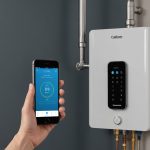Overview of Smart Water Heaters
Smart water heater technology has revolutionized how we interact with domestic water heating systems, integrating them seamlessly into smart home environments. These devices offer homeowners the ability to control and monitor their water heating settings through smartphone control, providing unmatched convenience and efficiency. By syncing with existing smart home systems, smart water heaters allow for remote adjustments and real-time updates.
Key Features and Advantages
Smart water heater technology encompasses several noteworthy features, enhancing both functionality and user experience. Smartphone control stands out as a pivotal advantage, enabling users to manage heating schedules, adjust temperatures, and activate vacation modes directly from their mobile devices. This not only simplifies operation but also optimizes energy consumption, resulting in cost savings.
Also to see : Harnessing Voice Technology: Your Comprehensive Guide to Smart Home Lighting Management
When choosing a smart water heater, it’s essential to look for significant attributes such as energy-efficient operation, compatibility with existing smart devices, and comprehensive smartphone integration capabilities. These features ensure a cohesive and streamlined smart home ecosystem and prolong the lifespan of the water heater. By embracing such technology, users can experience both increased comfort and reduced environmental impact.
Smart water heaters, therefore, represent a valuable addition to any modern home, aligning advanced technology with everyday needs and sustainable living objectives.
Also read : Revolutionizing Senior Care: Turn Your Smartphone into an Innovative Home Management Center
Setting Up Your Smart Water Heater
Installing a smart water heater involves several critical steps to ensure seamless operation and integration. Before beginning, compile a pre-installation checklist that includes necessary tools and confirms compatibility with your current smart home systems. Prioritizing safety, it’s essential to disconnect power and water supplies before starting the installation.
Pre-Installation Checklist
Ensure all required equipment, like wrenches and screwdrivers, is accessible. Verification of compatibility with existing devices is crucial to avoid connectivity issues later. Observing safety precautions reduces risk during the installation process.
Step-by-Step Installation Process
Begin by connecting your smart water heater to the home wifi network. Follow the manufacturer’s installation guide closely, which usually involves linking the device with the app. Download and set up the associated mobile app to facilitate remote control and adjustments. Test connectivity by checking the water heater’s status through the app and making initial setup adjustments.
Configuring and Customizing Settings
Set temperature preferences and create heating schedules that align with your daily routine via the app. Utilize energy-saving modes to optimize performance. Enhance automation by integrating with other smart devices, creating a more cohesive smart home system. This integration can streamline operation, ultimately leading to increased efficiency and comfort.
Maximizing Efficiency and Performance
To fully leverage the advantages of smart water heater technology, focusing on energy efficiency is crucial. Implementing strategies that optimize energy usage not only enhances device performance but also significantly reduces costs over time.
A pivotal approach involves scheduling heating times based on daily usage patterns. By analysing when hot water demand is highest, users can adjust settings to ensure water is only heated when needed, thereby minimizing unnecessary energy consumption. This proactive management is easily achieved through smartphone control, allowing for remote adjustments at any time.
Another beneficial feature is the utilization of energy-saving modes, which many smart water heaters offer. These modes automatically adjust heating cycles to optimize energy use without compromising user comfort.
Remote access plays a key role in monitoring and adjusting settings promptly. It provides the flexibility to alter operations and maintain efficiency, even when away from home. Such accessibility can prevent wastage and ensure optimal performance.
Lastly, regular performance assessments, available via smartphone apps, can identify potential inefficiencies, allowing for immediate rectification. This continual monitoring aids in sustaining high efficiency and extending the water heater’s lifespan within a smart home ecosystem.
Troubleshooting Common Issues
Regular maintenance is essential to ensure your smart water heater operates effectively, and addressing common problems promptly can prevent further issues.
Identifying Connectivity Issues
If your water heater goes offline, check for common causes like interrupted wifi service. First, ensure the router is functioning and that the smart water heater is within range. To troubleshoot wifi connectivity problems, restart both the heater and the router. If these steps do not resolve the issue, reconfigure the device through its app. App-related issues might include outdated software; ensure the latest version is installed to maintain smooth remote control.
Addressing Performance Issues
Performance issues might manifest as inconsistent water temperatures or unusual noises. These are signs your heater may need resetting or recalibrating. Many smart heaters allow for simple recalibration through their app settings. If no improvement occurs, consult the user manual or consider professional service to identify and rectify the root cause.
Ensuring Long-Term Functionality
For sustained performance, conduct regular maintenance such as checking filters and sensors. Ensure your heater’s firmware stays updated; these updates often enhance functionality and security. When integrating with new smart home devices, verify compatibility to avoid disruptions.
Comparative Analysis of Popular Smart Water Heaters
Understanding the smart water heater reviews allows homeowners to make informed decisions aligned with their needs. Evaluating product comparisons focuses on key features and functionalities of top models.
Overview of Leading Models
Leading smart water heaters, such as the Rheem Performance, AO Smith Signature, and EcoSmart models, offer distinct advantages. Rheem Performance is praised for its reliability and rapid heating, while AO Smith Signature highlights seamless smartphone control and energy efficiency. In contrast, EcoSmart impresses with its compact size and eco-friendly technology. These smart water heaters are designed to integrate effortlessly into a smart home system. They enable remote supervision and adjustment via easy-to-use mobile applications.
User Experiences and Testimonials
User feedback consistently notes the convenience of smart water heater technology. Many cite appreciable energy savings and reduced utility bills as major benefits. Consumers appreciate the ability to customize heating schedules through intuitive apps. Testimonials often emphasise streamlined daily routines and enhanced comfort due to precise temperature control. Some users also report the occasional technical glitch but appreciate responsive customer support when issues arise.
Making an Informed Decision
Choosing the right smart water heater depends on factors like price, warranty, and customer support. Evaluating ecological benefits can reveal additional savings in energy costs. Smart technology supports both modern lifestyle enhancements and ecological responsibility.
Real-Life Applications and Benefits
Integrating smart water heaters into your home offers tangible, everyday advantages. Many users enjoy not only improved energy efficiency but also enhanced convenience in their routines. By harnessing smartphone control, daily tasks, such as adjusting water temperatures or scheduling heating sessions, become effortless. This functionality is particularly beneficial in diverse scenarios, such as having hot water ready just before you wake up or adjusting schedules while away on holiday.
Consider a family that needs a regular supply of hot water for morning showers yet wishes to conserve energy the rest of the day. Through smart technology, the heater can adapt to their specific usage pattern, pre-heating in advance and minimizing wastage during off-peak periods. This optimization leads to noticeable savings on energy bills over time.
Real-world testimonials often highlight these benefits, with many reporting smoother daily routines and greater comfort levels due to precise temperature management. Customers applaud the ease of use provided by smartphone integration, especially for remotely making changes at short notice. These examples underscore the practical enhancements smart water heaters contribute to modern living, aligning seamlessly with both lifestyle and ecological commitments.











